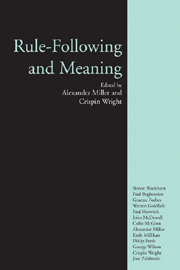Book contents
- Frontmatter
- Contents
- Acknowledgements
- The Contributors
- 1 Introduction
- 2 Skepticism and Semantic Knowledge
- 3 The Individual Strikes Back
- 4 Wittgenstein on Following a Rule
- 5 Wittgenstein, Kripke and Non-Reductionism about Meaning
- 6 Kripke on Wittgenstein on Rules
- 7 Critical Notice of Colin McGinn's Wittgenstein on Meaning
- 8 Meaning and Intention as Judgement Dependent
- 9 The Rule-Following Considerations
- 10 The Reality of Rule-Following
- 11 Truth Rules, Hoverflies, and the Kripke–Wittgenstein Paradox
- 12 Kripke on Wittgenstein on Normativity
- 13 Meaning, Use and Truth
- 14 Kripke's Normativity Argument
- Guide to Further Reading
- Index
6 - Kripke on Wittgenstein on Rules
- Frontmatter
- Contents
- Acknowledgements
- The Contributors
- 1 Introduction
- 2 Skepticism and Semantic Knowledge
- 3 The Individual Strikes Back
- 4 Wittgenstein on Following a Rule
- 5 Wittgenstein, Kripke and Non-Reductionism about Meaning
- 6 Kripke on Wittgenstein on Rules
- 7 Critical Notice of Colin McGinn's Wittgenstein on Meaning
- 8 Meaning and Intention as Judgement Dependent
- 9 The Rule-Following Considerations
- 10 The Reality of Rule-Following
- 11 Truth Rules, Hoverflies, and the Kripke–Wittgenstein Paradox
- 12 Kripke on Wittgenstein on Normativity
- 13 Meaning, Use and Truth
- 14 Kripke's Normativity Argument
- Guide to Further Reading
- Index
Summary
There is no doubt that Ludwig Wittgenstein thought the topic of rulefollowing to be important; nearly forty sections of the Philosophical Investigations are devoted to it, as are large swatches of the manuscripts published as Remarks on the Foundations of Mathematics. Its relevance to Wittgenstein's philosophy of mathematics was emphasized early on by Michael Dummett; but only recently has it received significant attention in the less specialized context of the Investigations, that is, with respect to questions of meaning and intentionality. This recent attention has, to a large extent, been engendered by Saul Kripke's exposition of Wittgenstein, first presented publicly at the 1976 Wittgenstein Colloquium in London, Ontario, and laid out more expansively in his book, Wittgenstein on Rules and Private Language. Kripke reads Wittgenstein to be mounting a skeptical challenge to the notion of following a rule and, thereby, also to the notion of meaning a word in a particular way; and then to be providing a solution to the challenge that accedes to much of the skepticism in it. This solution, it turns out, has direct and far-reaching consequences, including the impossibility of a private language and the refutation of many traditional theories of meaning. So construed, Wittgenstein's remarks on rule-following become the central and basic argument of the Investigations; indeed, they form, in an almost deductive sense, the foundation of Wittgenstein's later philosophy.
- Type
- Chapter
- Information
- Rule-Following and Meaning , pp. 92 - 107Publisher: Acumen PublishingPrint publication year: 2002



